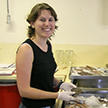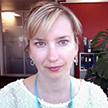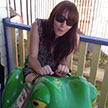Question: Hi Jennifer, Where would you rather be in the field, at the desk on the computer analysing data, at a conference or in the lab?
Keywords: conference, data, day2day, desk
Comments
-
commented on 18 Mar 2013:
Thanks for answering my question and haha free food is always good! I have a better understanding of what you do now but what kind of samples do you collect in the field? I think it’s boring to repeat things as well but as you said when results come back good you feel great athough my position is different as I might get good results in a maths test for example.
-
commented on 18 Mar 2013:
Yeah repetition’s never fun! 🙁
I collect water samples from rivers, drinking water pipes and lakes. Then I sequence the DNA in the water that has been left there by the animals that live in the water (animals shed skin cells which contain DNA). So then I can find out what animals are living in the water based on the DNA that I find. 🙂-
commented on 20 Mar 2013:
That sounds very complicated. How do you know what’s what?
-
commented on 20 Mar 2013:
It is quite complicated but once you’ve done it a few times it becomes easy. I
f you want to know what sequencing DNA is check out my answered questions as someone asked me what sequencing DNA is. ….In fact I will go copy what I wrote and paste it here so you can read.In answer to your question, I find out what is what by comparing the DNA (genetic) codes to genetic databases. The genetic databases are places where all scientists doing genetic work put the DNA codes and write what the species is next to it. For example they could have a fish and would take a fin clipping or a scale and sequence that fish individually then once they have the DNA code for that fish they put it into an online database next to the name of the fish. So people like me who are sequencing everything in a sample can enter the DNA codes we have into these databases and perform a search and it will tell me what species I have. Its very clever!!
-
commented on 20 Mar 2013:
All living things are made up of cells. DNA (or genes) are what we all have inside every single one of ours cells. DNA is the chemical inside the cells that carries instructions for making living organisms. Every single living thing on earth from plants, bacteria, humans, fish, all have DNA inside them.
When two animals mate, their offspring will have half their mothers DNA and half their fathers DNA. So every living thing in the world has its own unique DNA pattern (genetic code). As we inherit DNA from our parents we can trace back through history our ancestors and work out who is related to who. For example two brothers will have DNA (genetic codes) more similar to one another than two cousins.
We humans evolved from monkeys so we have more DNA in common with monkeys than we do with say a dolphin. We will have more DNA in common with a dolphin than say a tree because we are more closely related to dolphins than trees.
So what I do in my line of work is I take a sample (skin sample or blood sample if it a larger animal like a fish or mammal and if its a small animal like an insect or bacteria I will just use the whole thing). Then I break open the cells by using chemicals and bashing the cells about in a machine (DNA extraction). Once the cells are broken open the DNA is then released. DNA is so small so I then need to amplify the DNA which means I make lots and lots of exact copies of the DNA. Then I load the DNA sample onto a sequencing machine. DNA is made up of chemicals: adenine (A), thymine (T), cytosine (C), and guanine (G). The sequencing machine will ‘read’ the DNA and give me a genetic code back telling me the order of the chemicals using the first letter of each chemical (e.g. AGGGTCCTATGTTAAC).
As all living things have unique DNA codes I can tell what species something is by the genetic code. For example if I collect a bottle of water and I want to know what bacteria are present in my water I can break open the bacterial cells and sequence the DNA in the water to find out what bacteria are there. That way I can make sure that there are no harmful bacteria in the water that could make us ill.
I hope that helps! Did that make some sense? Let me know if it didn’t and what bits you don’t understand and I will try my best to explain it better.
-
-
-
commented on 21 Mar 2013:
Wow that’s a very long description! It’s amazing how much you know! Where did you get inspired to start working with science? Did it start at primary school? Jenny
-
commented on 21 Mar 2013:
No. Bu when I was in primary school I was very interested in nature and animals. I liked watching nature documentaries and going the zoo and things like that. I wanted to know about how animals behave and why the do certain things, etc. When I got into high I realised I really liked biology lessons and chose it as a subject to study in college once I left high school. I only started learning about genetics about half way through high school because they didn’t teach it to you until you were about 14/15 years old. Genetics is very complicated so I think that’s why they don’t teach it until your older. 🙂
-
commented on 21 Mar 2013:
I love animals and my nana was telling me about a program on tv and it just has a whole heap of bugs flying around with peaceful music in the background! WEIRD but i’m quite keen to see it. I LOVE documentaries! I would definitely choose a documentary over a cartoon.
-
commented on 22 Mar 2013:
I’m glad to hear that. 🙂
-









I most like to be in the field collecting samples because its a fun day out. But I also like analysing my data. Its like a puzzle that you need to solve and it feels good when you’ve got your results back. Especially when the results are good. I also enjoy writing too. The only thing I find a bit boring is when you have to do repetitive things in the lab. Conferences are good too because you learn new things and meet new people and there’s always free food! 🙂
1